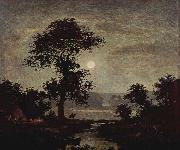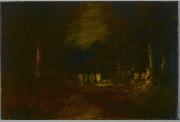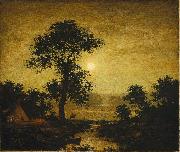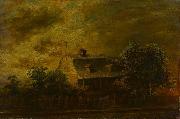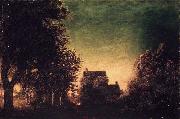Ralph Albert Blakelock El petróleo que Pinta la ReproducciónAll Ralph Albert Blakelock Oil Paintings(October 15, 1847 - August 9, 1919) was a romanticist painter from the United States. Ralph Blakelock was born in New York City on October 15, 1847. In 1864, Blakelock entered the Free Academy of the City of New York (now known as the City College) with aspirations of becoming a physician. After his third term he opted to dismiss his formal education and left college. From 1869-71 he traveled west, extensively wandering far from known civilization and spending time among the American Indians. Largely self-taught as an artist, he began producing competent landscapes, depicting select views from his travels, as well as scenes of American Indian life. His works were exhibited in the National Academy of Design. Moonlight, 1885, the Brooklyn MuseumIn 1877 Blakelock married Cora Rebecca Bailey; they had nine children. In art, Blakelock was a genius, yet, in business dealings and in monetary transactions he proved a failure. He found it difficult, if not crushing to maintain and support his wife and children. In desperation he found himself selling his paintings for extremely low prices, far beneath their known worth. In hopes of lifting his family from abject poverty, reportedly on the day his 9th child was born, Blakelock had offered a painting to a collector for $1000. The collector made a counter offer and after refusing the proposed sum Blakelock found himself in a bitter argument with his wife. After the domestic dispute, Blakelock returned to the patron and sold the painting for a much lesser sum. Defeated and frustrated, it is said he broke down and tore the cash into pieces. And so it was after such repeated failed business transactions that he began to suffer from extreme depression and eventually show symptoms of mental frailty. In 1899 he suffered a breakdown. |
|||

|
|||
|
|
|||
|
||||||||
| Ralph Albert Blakelock (October 15, 1847 - August 9, 1919) was a romanticist painter from the United States. Ralph Blakelock was born in New York City on October 15, 1847. In 1864, Blakelock entered the Free Academy of the City of New York (now known as the City College) with aspirations of becoming a physician. After his third term he opted to dismiss his formal education and left college. From 1869-71 he traveled west, extensively wandering far from known civilization and spending time among the American Indians. Largely self-taught as an artist, he began producing competent landscapes, depicting select views from his travels, as well as scenes of American Indian life. His works were exhibited in the National Academy of Design. Moonlight, 1885, the Brooklyn MuseumIn 1877 Blakelock married Cora Rebecca Bailey; they had nine children. In art, Blakelock was a genius, yet, in business dealings and in monetary transactions he proved a failure. He found it difficult, if not crushing to maintain and support his wife and children. In desperation he found himself selling his paintings for extremely low prices, far beneath their known worth. In hopes of lifting his family from abject poverty, reportedly on the day his 9th child was born, Blakelock had offered a painting to a collector for $1000. The collector made a counter offer and after refusing the proposed sum Blakelock found himself in a bitter argument with his wife. After the domestic dispute, Blakelock returned to the patron and sold the painting for a much lesser sum. Defeated and frustrated, it is said he broke down and tore the cash into pieces. And so it was after such repeated failed business transactions that he began to suffer from extreme depression and eventually show symptoms of mental frailty. In 1899 he suffered a breakdown. |
||||||||
|
|
||||||||
| Pintura identificación:: 58267 Moonlight Moonlight, 1885, the Brooklyn Museum |
||||||||
|
|
||||||||
| Pintura identificación:: 71463 The Captive ca. 1879(1879) Oil on canvas 40.5 x 60.5 cm (15.94 x 23.82 in) |
||||||||
|
|
||||||||
| Pintura identificación:: 71628 Moonlight between 1885(1885) and 1889(1889) Oil on canvas 68.7 x 81.3 cm (27.05 x 32.01 in) |
||||||||
|
|
||||||||
| Pintura identificación:: 71676 Farmhouse of F.B. Guest ca. 1868(1868) Oil on canvas 40.9 x 61.2 cm (16.1 x 24.09 in) |
||||||||
|
|
||||||||
| Pintura identificación:: 71686 Edge of the Forest between 1880(1880) and 1890(1890) Oil on canvas 40.5 x 61 cm (15.94 x 24.02 in) |
||||||||
|
|
||||||||
| ARTISTA PREVIO PROXIMO ARTISTA | ||||||||
|
|
||||||||
|
Ralph Albert Blakelock (October 15, 1847 - August 9, 1919) was a romanticist painter from the United States. Ralph Blakelock was born in New York City on October 15, 1847. In 1864, Blakelock entered the Free Academy of the City of New York (now known as the City College) with aspirations of becoming a physician. After his third term he opted to dismiss his formal education and left college. From 1869-71 he traveled west, extensively wandering far from known civilization and spending time among the American Indians. Largely self-taught as an artist, he began producing competent landscapes, depicting select views from his travels, as well as scenes of American Indian life. His works were exhibited in the National Academy of Design. Moonlight, 1885, the Brooklyn MuseumIn 1877 Blakelock married Cora Rebecca Bailey; they had nine children. In art, Blakelock was a genius, yet, in business dealings and in monetary transactions he proved a failure. He found it difficult, if not crushing to maintain and support his wife and children. In desperation he found himself selling his paintings for extremely low prices, far beneath their known worth. In hopes of lifting his family from abject poverty, reportedly on the day his 9th child was born, Blakelock had offered a painting to a collector for $1000. The collector made a counter offer and after refusing the proposed sum Blakelock found himself in a bitter argument with his wife. After the domestic dispute, Blakelock returned to the patron and sold the painting for a much lesser sum. Defeated and frustrated, it is said he broke down and tore the cash into pieces. And so it was after such repeated failed business transactions that he began to suffer from extreme depression and eventually show symptoms of mental frailty. In 1899 he suffered a breakdown. |
||||||||
|
|
||||||||
|
CONTACTE EEUU |





